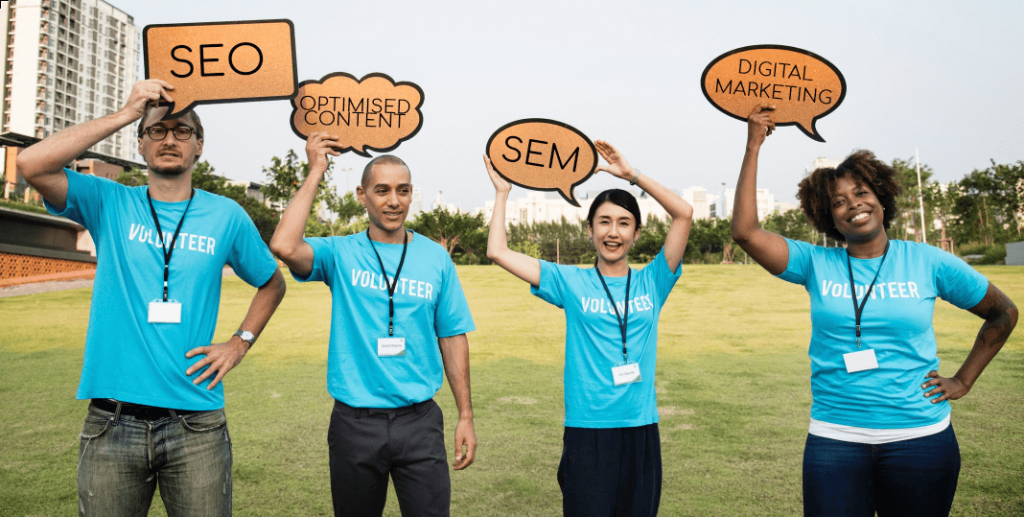Search Engine Optimisation refers to optimising your website to improve your visibility in search engine results – it helps you to be found.
How can SEO help my charity?

Good SEO can help charities in many ways:
- Increase donations — many people prefer online donations, nowadays, and helping people find your charity’s website will have a positive impact on the donations you receive.
- Establish brand awareness — charities need to be known and trusted, and a website that ranks high in search results, such as Google, helps to promote trust. People’s confidence in a charity will take a hit if they have to trawl through 10 pages of search results to find its website!
- Draw volunteers — if your charity is after volunteers, a high-ranking website with persuasive content will help convince people to donate their free time.
- Raise awareness — increasing awareness of your charity will, in turn, help to raise awareness and promote the charity’s cause, even more so if the charity is locally oriented.
Charity SEO tips
Keywords
At the heart of SEO is choosing relevant keywords — see our guide to effectively researching keywords.
In general, choose keywords that:
- Describe your content and aims accurately.
- Users are likely to enter into search engines, like Google, to find your content.
- Users will remember, and will know to use again to find you in the future.
- Aren’t too competitive; strong competition for keywords will make your job far more difficult!
Content
Write engaging, persuasive content that will educate readers about your charity’s cause and aims, and help persuade them to donate their money or their time.
Writing good content is incredibly important for SEO, and is just as important to charities as it is to other businesses or organisations.
Always ask yourself: if I were reading this for the first time, would it capture my attention and inform me about this charity adequately, while remaining engaging and interesting?
You don’t need to write a masterpiece, but you should try to keep your readers’ attention.
It’s important your charity’s site has good content, because search engines judge your site based on how long visitors spend on the site. If visitors immediately leave, for example, Google is likely to negatively judge that website’s relevancy for the keywords the user entered to find the site.
Aim to write content that will make your visitors want to explore the site further!
Accessibility
With over 3.7 billion unique mobile users in 2018, mobile devices are likely to substitute a major chunk — perhaps even the majority — of users visiting your charity’s website.
This means that designing mobile-friendly websites is particularly important. Mobile users can be particularly impatient when it comes to sites that are poorly optimised — if a website fails to load, or renders content incorrectly, or has text that is far too small to be legible on handheld devices, your SEO will suffer as a result.
Tips for mobile-friendliness:
- Don’t use Flash or Java applets — these will not work on many devices. Indeed, Firefox and Chrome have discontinued support for Flash, so even many laptops, Macs and PCs will not be able to view your content!
- Don’t use tiny text — make your text a good size, so it’s legible and readable on mobiles, tablets and other devices with small screens.
- Do make links stand out — make sure your links are clearly links; make them a different colour from the rest of the text, and make sure enough text is linkified, so mobile users can click on them with ease. Remember: getting users to explore your site is important, so your links need to be visible and easy to interact with!
- Do link to other mobile-friendly sites — avoid linking to other websites, even charity’s, if you know they are not accessible on mobile devices, or are poorly optimised. A frustrated mobile user may leave your site altogether if you continue to link to content they’re having problems with.
Further, consider how many web users have limited or impaired vision. Learn how to optimise websites for blind and vision-impaired users.
Use a sensible web-safe font, like Arial or Verdana, and avoid the so-called “Dyslexia fonts” such as OpenDyslexic. There is no evidence Dyslexia fonts work or are useful.
Errors
Fixing errors and mistakes will improve your SEO. Certain errors take mere minutes to fix, but might have a big impact on SEO.
Here are some things you can look out for:
- 404s — while 404s won’t directly hurt your SEO according to Google, they do damage your user experience. So check the links on your pages to make sure they don’t point to content that no longer exists. You can use the great Chrome extension Check My Links to automatically mark 404s for you.
- Broken redirects — if your charity’s website redirects users in certain places, make sure the redirect works, and check up on redirects you’ve made previously! Redirects that take users to non-existing or irrelevant content should be repaired.
- Images without alt text — give your pages’ images sensible alt text; learn more about alt text and how to write good descriptions.
- Typos — not only are typos ugly, they could damage visitors’ confidence in your charity. Plus, if you have typos in your chosen keywords, this will directly hurt your SEO. There are many online tools to check spelling and grammar, and most browsers have built-in spellcheck in 2018, so take advantage of this!